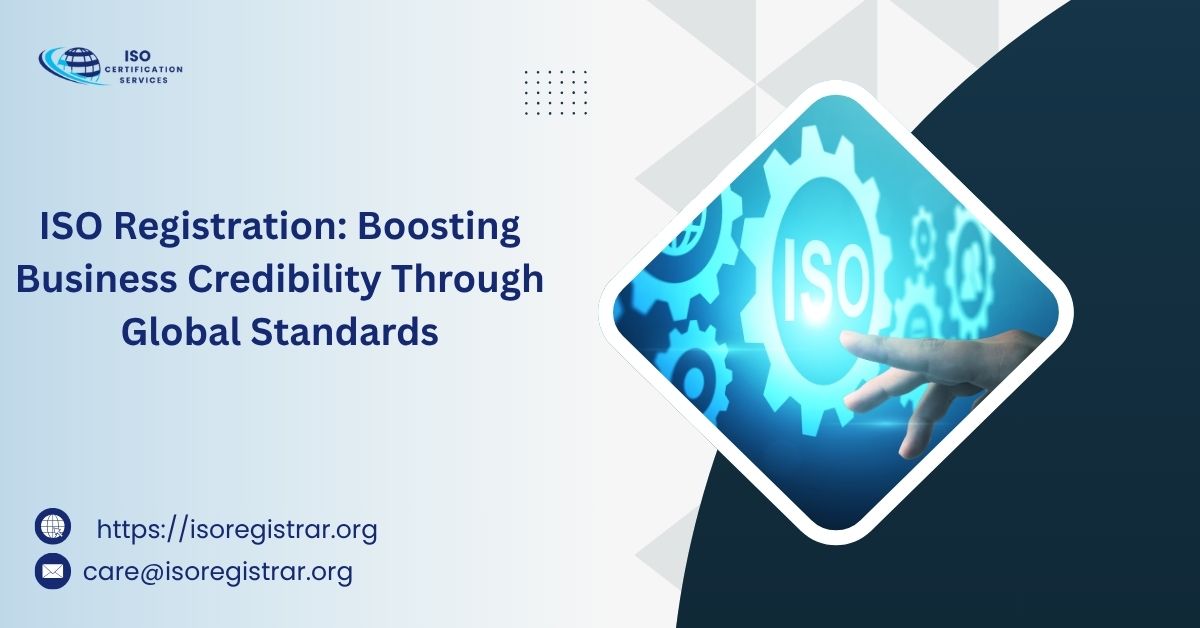In today’s highly competitive market, trust, quality, and credibility play a vital role in shaping customer perception and business success. Whether you’re a manufacturer, service provider, or startup, proving that your processes meet international standards can be a game-changer. That’s where ISO Registration comes into play.
ISO certification is more than just a label; it’s a powerful tool for improving operations, attracting clients, and staying ahead in the global marketplace. This article explores the importance of ISO registration, the types of ISO standards, benefits, who needs it, the process, and how it aligns with India’s growth journey.
What is ISO?
ISO (International Organization for Standardization) is an independent, non-governmental international body that develops standards to ensure the quality, safety, and efficiency of products, services, and systems.
ISO is headquartered in Geneva, Switzerland, and includes members from over 160 countries.
ISO standards act as international benchmarks that help businesses:
- Improve product quality
- Enhance customer satisfaction
- Increase process efficiency
- Enter global markets
What is ISO Registration?
ISO Registration (commonly called ISO Certification) is the process by which an organization demonstrates compliance with specific ISO standards.
After a successful audit, a certificate of compliance is issued by a recognized certification body. This certifies that the company adheres to specific international standards in its operations.
Why is ISO Registration Important?
Here’s why ISO registration is becoming increasingly vital in business:
Quality Assurance: Demonstrates consistency and reliability in products/services.
Market Access: Many government and international contracts require ISO certification.
Customer Trust: Certification enhances confidence among clients, vendors, and partners.
Operational Efficiency: Helps streamline internal processes and reduce waste or errors.
Legal Compliance: Aligns with safety, environmental, and operational regulations.
Global Recognition: ISO standards are respected and accepted worldwide.
Who Needs ISO Registration?
ISO certification is suitable for all business types and sizes. Common industries include:
Manufacturing & Production: Factories, OEMs, and industrial suppliers
Healthcare & Pharmaceuticals: Hospitals, clinics, diagnostic labs, and pharma companies
IT & Software Companies: Software development, IT consulting, cloud solutions
Service-Based Companies: Marketing, HR, legal, finance, logistics
Retailers & E-commerce: Online sellers, retailers, and food businesses
Construction & Infrastructure: Builders, architects, civil contractors
Popular ISO Standards in India
ISO 9001 – Quality Management System (QMS)
- Ensures product/service quality and customer satisfaction
- Applicable to all types of businesses
ISO 14001 – Environmental Management System (EMS)
- Helps reduce environmental impact
- Ideal for manufacturing, construction, and industrial units
ISO 27001 – Information Security Management System (ISMS)
- Protects sensitive data and information systems
- Essential for IT, software, and finance companies
ISO 22000 – Food Safety Management System (FSMS)
- Ensures food hygiene and safety
- Required for food businesses, restaurants, and manufacturers
ISO 45001 – Occupational Health & Safety Management System
- Promotes employee health, safety, and workplace risk control
- Important for construction, factories, and large workplaces
ISO 13485 – Medical Devices Quality Management System
- Maintains quality and regulatory compliance in medical devices
- For manufacturers and distributors of medical equipment
ISO 50001 – Energy Management System
- Improves energy efficiency and reduces consumption
- Suitable for energy-intensive industries
ISO 21001 – Educational Organizations Management System
- Enhances quality in teaching and learning processes
- For schools, colleges, and training centers
Documents Required for ISO Registration
Here’s a simple list of commonly required documents:
Business Registration Proof: MSME, GST, PAN, CIN (for companies)
Address Proof: Utility bills, rental agreement, property papers
Scope of Business: Description of products/services
Organization Chart: Department-wise structure (optional)
Existing Operational Procedures: Quality manuals or process documents (if any)
Copy of Letterhead and Company Logo
Employee/Staff List: Number of employees, roles, etc.
ISO Registration Process (Step-by-Step)
Choose the Right ISO Standard: Select the ISO standard that fits your business needs and aligns with your goals.
Visit the Certification Portal: Go to the official ISO certification website.
Fill Out the Application Form: Complete the online form, ensuring all details are accurate.
Submit Your Application: Review, submit, and double-check all details.
Payment: After submitting the form, pay the nominal charges.
Certificate Confirmation: A consultant confirms the ISO standard you're applying for.
Receive Your ISO Certificate: Once it’s approved, your ISO certificate will be sent to your registered email.
Benefits of ISO Certification for Indian Businesses
International Acceptance: ISO certification acts as a global passport to enter international markets.
Business Growth: Boosts brand value and opens doors to government tenders and large projects.
Stronger B2B Relationships: Many clients and vendors prefer working with ISO-certified partners.
Improved Internal Processes: Encourages documentation, accountability, and consistency.
Competitive Advantage: Helps in differentiating your business in a crowded market.
ISO Certification Renewal
- ISO certificates are valid for 3 years
- Annual surveillance audits are conducted to maintain validity
- Renewal must be done before expiry by re-auditing the system
How ISO Certification Supports Government Schemes
ISO certification aligns well with national initiatives like:
- Make in India – Enhances manufacturing quality and exports
- Startup India- Boosts investor confidence in certified startups
- Digital India – Encourages ISO 27001 and other IT-related standards
- Udyam/MSME – Increases visibility and competitiveness of small businesses
Many government tenders require ISO certification, making it an essential step for business growth.
NOTE:- Apply for ISO CERTIFICATION 9001 : 2015
Conclusion
In a world where quality, security, and trust determine business success, ISO registration is your badge of reliability. It’s not just about getting a certificate — it’s about committing to a culture of continuous improvement and excellence.
Whether you’re a small business, a growing startup, or an established brand, ISO certification can help you win customer trust, access new markets, and grow confidently in a structured and credible way.





Comments